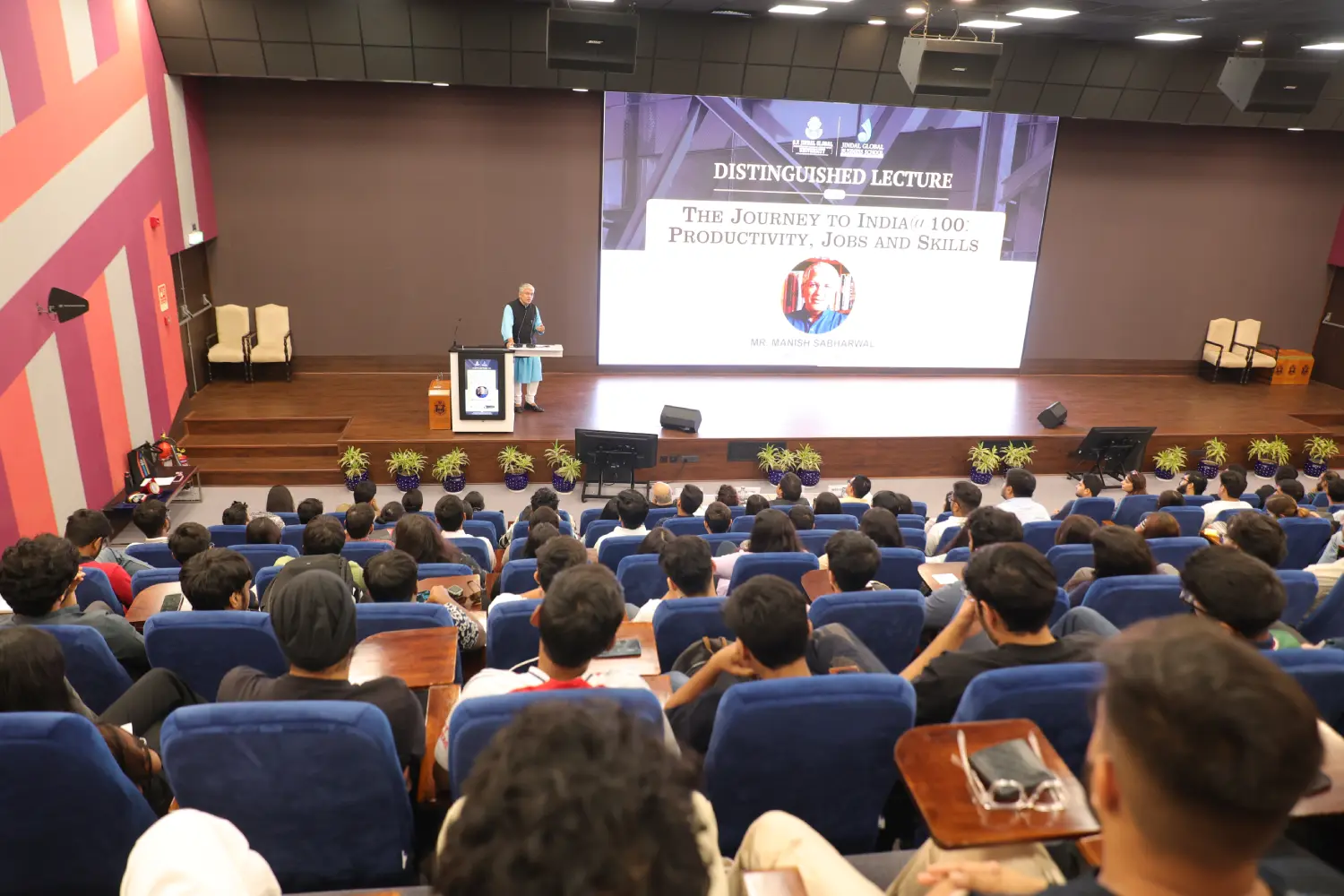Introduction
The dynamic facet of global business has intensified the demand for robust and comprehensive business administration practices. Effective management now necessitates not only technical knowledge but also interpersonal proficiency. The top management universities in India play a pivotal role in this transformation by nurturing both technical competence and essential soft skills through a blend of academic rigour, industry engagement, and experiential learning, such as internships and workshops.
The Master of Business Administration (MBA) programme has emerged as a critical conduit for producing capable business leaders. It arms students with strategic, analytical, and leadership capabilities required for navigating complex organisational environments.
Understanding Business Management from an Academic and Professional Perspective
Business management has a complex framework of activities designed to ensure the effective functioning of an enterprise. It involves planning, organising, leading, and controlling organisational resources and processes to achieve desired outcomes.
The top management universities in India design MBA curricula that are experiential, practical, and interdisciplinary. A typical MBA syllabus includes subjects such as Finance, Marketing, Strategy and Entrepreneurship, Human Resource Management, Operations Management, Information Systems, and International Business.
Over four semesters, students are gradually exposed to increasing levels of complexity in business theory and practice. This journey culminates in the conferral of the MBA degree and serves as a runway for their professional careers.
MBA At Top Management Universities in India: Skills and Scope for Students
The academic training in an MBA programme is designed to instil a profound understanding of the commercial environment. It also builds a repertoire of essential skills, including:
- Strategic planning and innovation
- Communication and negotiation
- Analytical thinking and problem-solving
- Team leadership and motivation
- Data analysis and interpretation
The modern corporate world places a strong emphasis on candidates who demonstrate exceptional management capabilities. An MBA degree, especially from a reputed institution, opens the door to roles such as:
- Business Consultant
- Financial Analyst
- Marketing Manager
- Human Resource Manager
- Operations Manager
- Product Manager
- Investment Banker
- Supply Chain Manager
- Project Manager
Employers increasingly value a balance of technical expertise and interpersonal aptitude, making soft skills a vital component of career readiness.
The Role of Soft Skills in Effective Management
Soft skills are non-technical abilities that influence how individuals interact, communicate, and collaborate within organisations. These include emotional intelligence, adaptability, critical thinking, leadership, and interpersonal communication.
Research indicates that 92 percent of hiring managers consider soft skills equally important to technical capabilities when evaluating candidates for managerial roles. Furthermore, 91 percent of management positions list soft skills as their most desired criteria.
The distinction between hard and soft skills is significant but complementary. While hard skills such as data analytics, market research, and financial planning are foundational, soft skills determine how effectively these are applied in team-based, client-facing, or leadership contexts.
Notably, investment in soft skills training yields tangible organisational benefits. Research by SHRM shows that companies that prioritise soft skills training report a 12 percent increase in productivity. In addition, the American Society for Training and Development reports a 256 percent return on investment for every dollar spent on such training.
Given this, MBA programmes must incorporate structured modules and real-world exposure that strengthen both sets of skills, ensuring graduates are well-prepared for evolving market demands.
Full Time MBA Programme Structure at Jindal Global Business School
Jindal Global Business School (JGBS) is among the top management universities in India, known for its value-based education and global perspective. The full-time MBA programme at JGBS spans two years and is divided into four semesters.
The curriculum includes modules in:
- Business Statistics
- Micro and Macro Economics
- Marketing and Financial Management
- Operations and People Management
- Organisational Behaviour
- Supply Chain Management
- Business Communication
- Design Thinking and Innovation
- Strategic Management
- Business Ethics and Corporate Social Responsibility
- Legal Aspects of Business
- Emerging Technologies such as Blockchain and Artificial Intelligence
JGBS ensures continuous engagement with industry through mandatory internships and guest lectures. During the 2024–2025 academic year, students undertook 1500+ internships. These real-world experiences are instrumental in reinforcing classroom learning, with an emphasis on soft skills application and personal development. According to the Society for Human Resource Management, such training correlates with measurable productivity gains.
How to Get Admission for a Full-Time MBA Programme at JGBS
The admission process at JGBS is structured and holistic. Applicants must provide:
- A recent passport-size photograph
- Scanned copies of Class X, XII, and graduation mark sheets
- Graduation certificate
- Entrance examination scores
Candidates shortlisted based on academic records and exam performance are invited for an interview with the JGBS faculty. Selection is based on overall merit, clarity of goals, and communication abilities.
What is Unique About Jindal Global Business School
JGBS stands out for several reasons:
- Rankings and Recognition: Ranked among the Top 6 private B-schools in India and in the Top 451–500 globally for Business and Management studies by the QS World University Rankings by Subject 2025. The BBA programme holds the No. 1 rank in India (Outlook ICARE 2023 & 2024).
- Academic Excellence: Over 180 full time faculty members, with more than 98 percent holding PhDs. Faculty published over 290 Scopus-indexed articles in 2024–2025, including 8 in FT 50/ABDC A* and +60 in ABDC A.
- Global Outreach: Over 340 international collaborations with 125+ partner institutions across 30+ countries, offering over 225 dual degree programme and more than 115 single semester exchange opportunities.
- Industry Focus: Over 730 guest lectures annually by industry professionals and veterans, ensuring industry relevance in every course.
- Student-Centric Development: A vibrant campus with over 3,600 students from 27 states and territories, alongside structured elections and student governance.
- Entrepreneurship and Innovation: The IDEATE Lab supports entrepreneurial talent by offering venture-building programmes, mentorship from industry experts, and partnerships to support student and alumni startups.
This unique combination of interdisciplinary learning, global exposure, industry integration, and ethical grounding ensures that graduates from JGBS, one of the top management universities in India are well-prepared for leadership roles in the fast-evolving business world.
FAQs
-
What are soft skills and why are they important in management?
Soft skills refer to interpersonal attributes such as communication, leadership, adaptability, and emotional intelligence. These are essential for managing teams, building client relationships, and making strategic decisions.
-
How does JGBS support soft skill development?
JGBS integrates soft skill training through internships, workshops, live projects, and over 730 annual guest lectures that offer real-time industry perspectives. Jindal Global Business School consistently secures a place in the top management colleges in India list due to its interdisciplinary curriculum, experienced faculty, and strong industry collaborations.
-
Is industry exposure part of the MBA programme at JGBS?
Yes. All students are required to complete summer and winter internships with reputed companies. Courses are enhanced through mandatory industry lectures.
-
What makes the JGBS faculty distinctive?
Over 98 percent of faculty hold doctoral degrees, and collectively they bring more than 290 years of industry experience. Our faculty produce rigorous and impactful research, published in top peer-reviewed journals.
-
Are there opportunities for international exposure?
Absolutely. JGBS has over 340 global collaborations, providing numerous semester exchange and dual degree opportunities for students.





